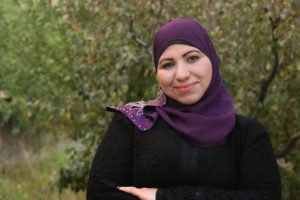“You’ll be everything to this family”
Since I moved here to Lebanon, I have been overcome with a desire to learn just about everything: I took a nursing course, a hairdressing course, and then an embroidery course. Things are different now from how my life was in Douma, where I was simply a housewife. I am a 33-year-old mother of five.
I struggled a lot when I first got here. No one wanted to rent us a room or a house or let us live in a house of any kind. Fear and exploitation are to be found: the Lebanese were afraid of Syrians. I had to endure many provocative remarks. The owner of one of the houses subjected me to a lot of verbal and tried to harass me. I was threatened and beaten more than once. Someone threatened that he would imprison my husband. We reached a point where we could no longer afford the rent of our house. I feel immense regret, as I fled death only to suffer such indignities, and above all else I had five mouths to feed. I couldn’t take it anymore, so I moved to al-Rahma camp. I found it to be safer than a home. People there are like me – we are all poor.
When I heard the announcement for a literacy program on the loudspeakers, i went and enrolled. I wanted to build friendships and get to know who I am living with at the camp. With each new letter we learned, we had a story to tell. These stories were very profound, and later required a writing workshop with author Iman Said. A total of 25 women were selected to participate in the writing workshop. An ocean of stories seethed within every one of us. We started writing and received a lot of support and guidance from Iman. Then we conducted a painting workshop, and collectively wrote a book which we called Balcony of Roses. It was the title of one of the stories I wrote during the workshop. I have four stories in that book: Mother, Resonance of Agony, The Crossing, and Balcony of Roses.
In that story, Balcony of Roses, I talked about my house that I left behind and its rose-adorned balcony. When I returned home, I did not even find the walls of the balcony. Mother is a first-hand experience from one of my days under the siege. The story is about a mother who was trying to protect her six children from pouring shells. She laid on top of them in the open. Her son died and she didn’t even notice. She was running circles with her son’s corpse in her arms and didn’t realize he was dead. She lost all her children. She went hysterical. The third story is somewhat different. It is my personal story of how I met my husband. We would meet in secret, and he had to fight his family for me. I am from Damascus and he is from Aleppo. I was considered a stranger. In their eyes, my husband’s cousin or basically any girl from Aleppo is a more fitting choice for him than me. Our engagement went on for three years, and one night, they brainwashed him and as a result of the great pressure they forced on him, my husband called me on the phone and said, “I hereby divorce.” three times. I fainted from the shock and had to be admitted into a hospital. Three months later, he knocked on my door and asked for my forgiveness, as he was under a lot of pressure from his family. My family agreed to give him one month to set up the wedding, or there will be no wedding at all. And so it was: One month later, we were newlyweds.
After the writing workshop, we moved on to the theater. We felt that the theater was capable of conveying stories to people. When I participated in the workshop, I was criticized by some: “You have five children … Why would you do that? …No, this is a disgrace… We are a conservative country; how could this be?” I didn’t pay any attention to them, and said to myself, “We will see who will envy whom in the end.” My husband, on the other hand, was very supportive. He told me, “On the contrary, write and tell our stories, maybe we men are not as good at expressing ourselves as you are. Maybe you can express both your and our pains.” Living in camps was a lot harder for men. Sometimes raids take place, and they take men who have no papers or ID cards. We talked about this in the play, as well as many other themes.
When we premiered the play, everyone was shocked. They did not expect us to speak with such boldness. My husband is very proud of me. The first time he watched the play alone, and after it ended, he said to me, “Maybe it was God’s will that I have this sickness and you have this strength.” My husband is epileptic and often suffers acute seizures. He was unable to work for a while. In our second performance, our children attended. They would applaud me even before my scene starts.
The experience of joining the Action for Hope workshops has made me a strong woman. I now love working, and have something pleasant to look forward to. At one point, we women thought that our lives were over. We fell into despair, but the workshops changed everything. When the classes cease for whatever reason, we eagerly wait for them to come back and keenly demand: “Come on, arrange a new course!”

Author: Khuloud Zahra
Activity: Theater/Storytelling
Story collected and compiled by: Mona Merhi
Date and place: 19 May 2019 Action for Hope school – Bar Elias


